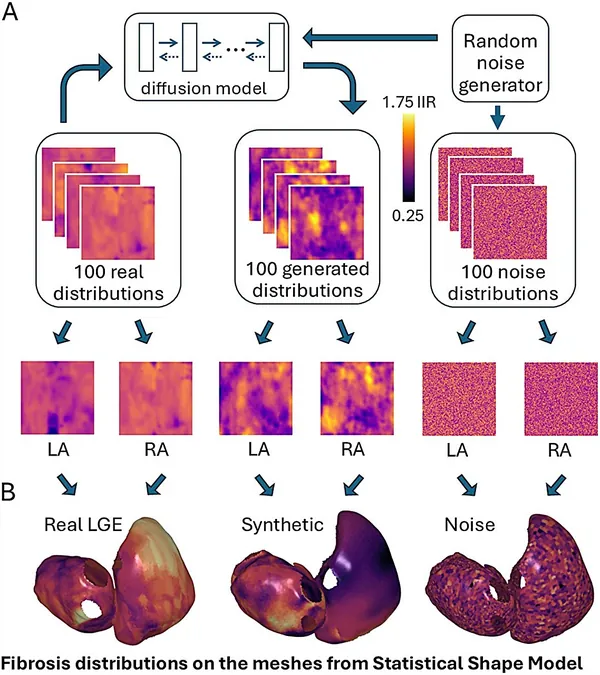
Revolutionary AI Technology Creates Synthetic Heart Models to Transform Atrial Fibrillation Treatment
2025-04-11
Author: John Tan
A Game-Changing Innovation in Atrial Fibrillation Care
Groundbreaking research from Queen Mary University of London unveils an AI tool that crafts synthetic yet anatomically accurate models of fibrotic heart tissue. This innovation is set to enhance treatment planning for patients battling atrial fibrillation (AF), a prevalent heart rhythm disorder.
Understanding Heart Fibrosis and Its Impact
Fibrosis, marked by the development of scar tissue in the heart, often arises from aging, prolonged stress, or the AF condition itself. These tough, fibrous patches can disrupt electrical signals in the heart, leading to the erratic beats synonymous with AF. Assessments through advanced MRI scans—specifically LGE-MRI—highlight how the pattern and distribution of this scarring can heavily influence treatment outcomes.
Challenges in Current AF Treatments
Typically, atrial fibrillation is addressed with a procedure called ablation, where doctors create small scars to block irregular signals. However, the success rates of this approach can be highly variable, and predicting the most effective method for individual patients remains a daunting task. Although AI shows potential in outcome forecasting, progress has lagged due to access restrictions to high-quality imaging data.
Innovative AI Solutions to the Rescue
Dr. Alexander Zolotarev, a key researcher, explains, "Obtaining a sufficient number of LGE-MRI scans for training AI is a significant hurdle." The team trained their AI model on just 100 real scans from AF patients, which then generated 100 synthetic fibrosis patterns that closely mirrored actual heart scarring. These virtual models allowed researchers to simulate various ablation strategies tailored to different patient anatomies.
High Accuracy Meets Patient Privacy
Using an advanced diffusion model, the team achieved synthetic fibrosis distributions that matched real patient data with remarkable precision. When tested on 3D heart models, the predictions derived from AI-created patterns were nearly as accurate as those based on actual patient data, all while safeguarding patient privacy and allowing exploration of a broader range of cardiac scenarios.
AI: A Supportive Tool for Clinicians
This research underscores AI's role as a clinical support mechanism rather than a decision-maker. Dr. Zolotarev emphasizes, "This isn’t about replacing doctors. It’s about equipping them with a sophisticated simulator to explore treatment options on a digital twin of each patient’s unique heart structure before surgery."
The Future of Personalized Heart Care
Leading this innovative study, Dr. Caroline Roney declares, "We’re thrilled with this research as it tackles the critical issue of limited clinical data for creating cardiac digital twins. Our advancements pave the way for large-scale in silico trials aimed at tailored treatments for AF patients."
A Significant Impact on AF Patients
With atrial fibrillation affecting 1.4 million individuals in the UK and the ablation procedure failing in about half of cases, this technology holds the promise of drastically reducing the need for repeat procedures. Importantly, the AI approach also addresses two pressing healthcare challenges: the scarcity of patient data and the imperative to protect sensitive medical information.


 Brasil (PT)
Brasil (PT)
 Canada (EN)
Canada (EN)
 Chile (ES)
Chile (ES)
 Česko (CS)
Česko (CS)
 대한민국 (KO)
대한민국 (KO)
 España (ES)
España (ES)
 France (FR)
France (FR)
 Hong Kong (EN)
Hong Kong (EN)
 Italia (IT)
Italia (IT)
 日本 (JA)
日本 (JA)
 Magyarország (HU)
Magyarország (HU)
 Norge (NO)
Norge (NO)
 Polska (PL)
Polska (PL)
 Schweiz (DE)
Schweiz (DE)
 Singapore (EN)
Singapore (EN)
 Sverige (SV)
Sverige (SV)
 Suomi (FI)
Suomi (FI)
 Türkiye (TR)
Türkiye (TR)
 الإمارات العربية المتحدة (AR)
الإمارات العربية المتحدة (AR)